Recently updated on April 26th, 2024 at 11:59 am
For businesses looking to sow seeds in the second-largest economy in the world with a real chance of surpassing the US by 2030, an effective strategy of website localization for China is especially important to ensure the marketing messages being adapted to the targeted audience while staying true to their brand style and tone of voice.
What’s Website Localization?
Website localization is the process of adapting website content for a targeted audience that speaks a different language and holds different cultural values.
It includes localization of every element of your website, including:
Website design aesthetics, user experience, currency, date format, address format, name format, connection to local social media, keywords optimization based on local search engine algorithm, and so on.
What is Chinese Website Localization?
Chinese website localization refers to the process of adapting a website to make it culturally and linguistically appropriate for Chinese-speaking audiences.
Translation vs. Localization
What’s the difference between Chinese website translation and localization?
💡 Simply put, Chinese website translation is the process of translating your texts from Chinese into another or from another language into Chinese so that the meaning is equivalent.
💡 Chinese website Localization is a more comprehensive and wide-reaching adaptation process, addressing cultural, visual, and technological components of the Chinese market.
The terms translation and localization have existed in parallel. Translation is considered a process of localization. However, professional Chinese translators also address local specifics like linguistic terms and cultural nuances.
Differences Between Translation and Localization
| Translation | Localization | |
| Characteristics | Level 1: Word-for-Word translate meaning from original language to targeted language. Level 2: Transfer meaning from the original language to targeted language considering locale specifics, i.e., idioms and expressions, cultural nuances. | Localization is the process of adapting content to the targeted audience’s culture and social norms. It involves content translation, the adaptation of website colors, page layout, currency, time format, address format, measurement, keywords optimization based on the local search engine, conforming with local regulations and legal terms, etc. |
| Style | Rigid # Make sure each word is translated accurately. # Doesn’t make changes in website layout, images, etc. | Adaptive # Doesn’t require word-for-word translation. # Flexibility to change website colors, layout, images, etc. as long as staying true to its meaning and brand tone. |
| Relationship | Translation is a part of localization. | Locale specifics are elements of modern professional translation. |
Here’s an interesting example of website localization for China.

💡 Nike US follows western website aesthetics with simplicity and minimal colors. On the contrary, the Nike website localized for the Chinese market uses bright colors, dynamic pictures, and “11.11” Single Day promotion as header, creating a better user experience for the Chinese audience.
Website Localization for China
Website localization for China goes far beyond merely translating a website from English to Chinese.
💡 Website localization for China is usually completed by professional Chinese website translators who have a thorough grasp of the English/Chinese language, Chinese culture, Chinese consumer behavior, integration of Chinese social media, local regulations, and technical issues such as website hosting and Baidu SEO. Everything on your Chinese website should be geared to the Chinese taste.
Here we’ve listed many important points to help you with successful website localization for the Chinese market.
# Chinese Hosting
If you’re preparing your website localization for China market, the first step to enter China digitally is to choose your website hosting.
Should you go with hosting in China or outside?
Foreign businesses facing mainly a Chinese customer base are usually presented with the dilemma, and there’s a lot of conflicting information regarding the physical location of the web hosting.
Hosting Your Website in China vs. Hosting Your Website outside China
| Website Hosted outside China | Website Hosted in China | |
| Pros | # Easier and cost-efficient. # More freedom in information and data flow. | # Fast loading speed. # Minimize the risk of being blocked by the Great Fire Wall. # Trust from Chinese audience with .cn domain. # Easy to rank on Baidu. |
| Cons | # Possibility of being blocked by China’s Great Fire Wall. # Slow loading speed (on average 10 seconds slower). # Poor ranking or no index on Baidu. # Not eligible to advertise on Chinese digital platforms. | # Hassles of obtaining ICP license. # Complicated and lengthy setup process. # Strict regulations and laws. |
Onshore Hosting
Here’re the 4 popular cloud hosting companies in China:

ICP License
What’s ICP license?
In simple terms, Internet Content Provider (ICP) license is a type of permit required for individuals and businesses that want to host content within China, either on their own servers or on third-party servers.
Two Types of ICP License
| ICP license for commercial websites | ICP filing for non-commercial websites | |
| Usage | For commercial websites that offer goods or service. | For non-commercial content based websites. |
| ICP No. Format | 京ICP证123456号 (“京” represents Beijing, “证” means license, and “号” means “No.”). | 京ICP备12345678号 or 京ICP备2021123456号 (“京” represents Beijing, “备” means “record” and “号” means “No.”). |
Who Can Apply for a Content-based Non-commercial ICP Filling?
Chinese citizens with state-issued passports
Foreign individuals who are currently residing in China
Partially or wholly owned Chinese businesses
Who Can Apply for a Commercial ICP License?
A Chinese-owned business with a Chinese business license
A foreign business, where a Chinese business holds at least 51% ownership
💡 After getting your ICP permit, keep in mind that your ICP number must be displayed at the footer of your website, as shown below on Sina China website.
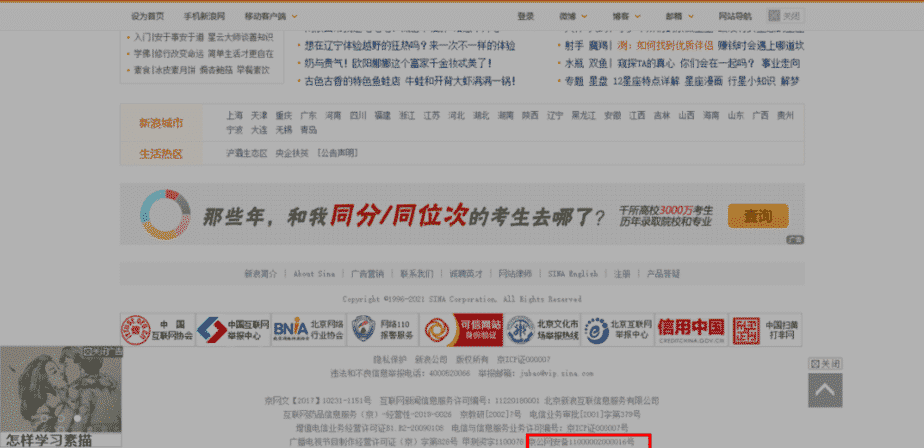
# Chinese Website Design
For western businesses who are translating and localizing for the Chinese market, it’s vital to understand the differences between Western and Chinese website design as there’s a world apart.
In terms of website localization for China market, the difference between the east and the west is so huge that it’s not easy to comprehend without a good grasp of differences in culture and internet user behavior.
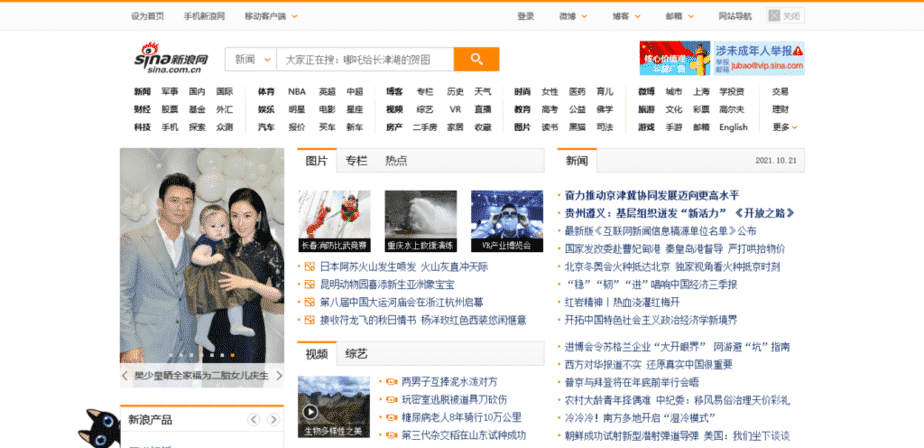
For instance, the landing page of the Chinese travel website often appears to be very busy with loads of information while the landing page of the western website is usually quite simple with a lot of white space. This is due to the difference in internet user behavior as Chinese internet users like to browse through huge amounts of information available to them at once, while western users enjoy searching for what they’re interested in. Moreover, the visual appearance of Chinese characters is much denser than in English, which is another reason that Chinese websites appear to be busier.
In addition, the landing page of Chinese eCommerce websites is usually loaded with promotions like Flash Sale, Deal of the Day, Group Buy, and many windows open at the same time, which creates a shopping atmosphere as if buying in a physical mall. These are important factors to take into account in the website localization for Chinese market.
Another important part of website localization for China is the use of colors. Western websites usually use minimalist colors like white, silver, and purple, while Chinese websites tend to use bright, dynamic colors like yellow and red. Yellow/gold is considered as a prestigious color as in imperial China it’s the emperor’s color, while red/vermilion symbolizes good fortune and happiness.
💡 While you’re using red/vermilion color for the Chinese audience, make sure the color tone is Chinese red rather than other types of red. A common mistake is using a random type of yellow and red colors. If you are not sure about the color codes for yellow and red in China, the definitive solution is to go with the colors of the Chinese flag as written on Wikipedia.
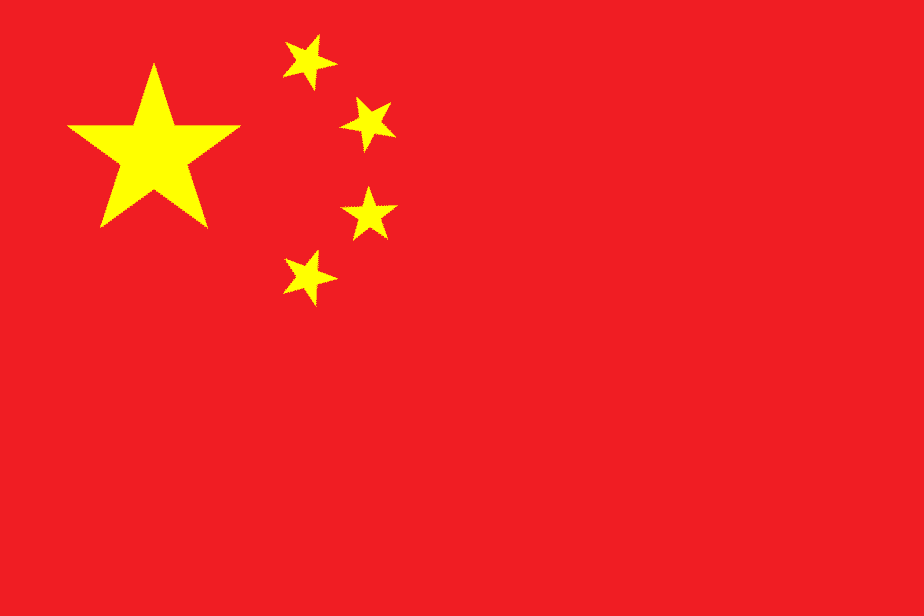
Color Code for Chinese Red
PANTONE: 185 C
Hexadecimal: #ee1c25
RGB: R238, G28, B37
Color Code for Yellow/Gold
PANTONE: 803 C
Hexadecimal: #ffff00
RGB: R255, G255, B0
The website design should also cater to the taste of the Chinese community, otherwise, potential customers could be lost if the website doesn’t have specific details the targeted audience desire.
Therefore, we’ve outlined some differences between Western and Chinese websites to help you speed up the process of website localization for Chinese market.
Western Website Design vs Chinese Website Design
| Western Website Design | Chinese Website Design | |
| Aesthetic | # Landing page design: Simplicity, minimalist, more white space. # Navigation: Organize sub menus vertically at sidebars. # Page length: Longer. | # Landing page design: Busy, usually utilized space fully for content, more vibrant colors, dynamic pictures, videos, more promotions like Deals of the Day, Flash Sales, Group Buy, customer loyalty programs. # Navigation: Organize sub menus into horizontal rows at the top of the page. # Page length: Shorter. |
| Technical Functions | # Integration of social media: Facebook, Twitter, Instagram, etc. # Online payment: PayPal, credit card, etc. # Search engine: Google. # Open link in the same window. | # QR code. # Live chat. # Integration of Chinese social media: WeChat, Weibo, etc. # Online payment: Alipay, WeChat pay. # Search engine: Baidu. # Open link in a new window. # Mobile first. |
# Format (Date, Name, Address)
Website localization for China requires tons of efforts, and you don’t want any formatting mistakes to damage the professional reputation of your brand. The format of date, name, and address written in Chinese is completely different from the west.
💡 If you’re targeting at Chinese audience at large, make sure your content is written in Chinese format.
| Western | Chinese | |
| Date | UK: dd-mm-yyyy (20th October 2021, 2021/10/20) US: mm-dd-yyyy (October 20, 2021, 2021/10/20) | yyyy-mm-dd (2021-10-20, 2021年10月20日, 年 means year, 月 means month, 日 means day) |
| Name | Given name – family name (Susan Smith) | Family name – given name (Cui Weihai) |
| Address | Name of Recipient Street name City, Postal code Country Weihai Cui 11-232, East Main Building Tsinghua University Beijing, 100871 P. R. China | Country Province City Street name Name of Recipient (Postal code is not necessary in China unless shipped by post office) 北京市清华大学东主楼11区232室 崔伟海 |
In addition to format differences in name, date, and address, there’re also significant differences in numbers, punctuation marks, and typesetting.
💡 To make sure you’re not committing any of these formatting errors in your website localization for China strategy, check out best practices for a flawless Chinese technical translation.
# Currency
As the second-largest economy in the world, the Chinese currency plays an increasingly important role in global transactions. When it comes to the name of the Chinese currency, there’s tons of confusion.
💡 On the global stage, the Chinese currency is usually known as CNY (abbreviated from Chinese Yuan) or RMB (Abbreviated from Renminbi), and the symbol is¥. The two terms are used interchangeably but CNY is more formal and preferred.
Do Chinese Also Use “Yuan” or “Renminbi” to Address Their Money?
No, we seldom use Yuan or Renminbi to address money in daily life. Instead, we use “kuai 块”, which in a way is similar to the Americans referring to dollars as “bucks”. That’s why you might often hear vendors in China say something costs “Wushi kuai (50块)”.
What’s the Difference Between Chinese Currency and Japanese Currency?
Another common mistake about Chinese currency is people tend to mix it with Japanese Yen since Chinese “Yuan” and Japanese “Yen” have similar pronunciation and the same sign¥.
💡 Chinese currency is usually written as CNY¥while Japanese currency is written as JPY¥ or JP¥.
# Measurement
International metric system for weights & measures is widely used in China, however, traditional measurement methods (Examples: Li 里, 1 Li = 0.5 km; Jin 斤, 1 Jin = 0.5 kg) are still use in some areas especially by the older generations but the impact is nearly negligible.
What Are the Differences Between the Chinese Metric System and Other Metric Systems?
To make things simple, we’ve outlined several key differences accumulated from our 15 years’ experience export from China.
| Metric System | Chinese System | Imperial System | |
| Weight | 1 kg | 2 斤 (jin) | 2.205 lb (pounds) |
| Capacity | 1 l (liter) | 1升(sheng) | 0.22 gal (gallon) |
| Length | 1 km 1 meter 1 meter | 2 里 (li) 3 尺 (chi) 1 meter | 0.62 miles 3.281 feet 1.0936 yards |
# Connection to Chinese Social Media
Chinese social media users are very tech affine, and social media apps are an integral part of everyday life than anywhere else in the world.
According DataReportal, there were 1.03 billion social media users in China in January 2023.
It’s not surprising that the Chinese tech giant Tencent has nearly the same revenue and monthly active users as Facebook.
Once you realize the power and exponential growth rate of the Chinese social media market, you might be tempted to expand your user base to include the Chinese audience in your website localization for China strategy.
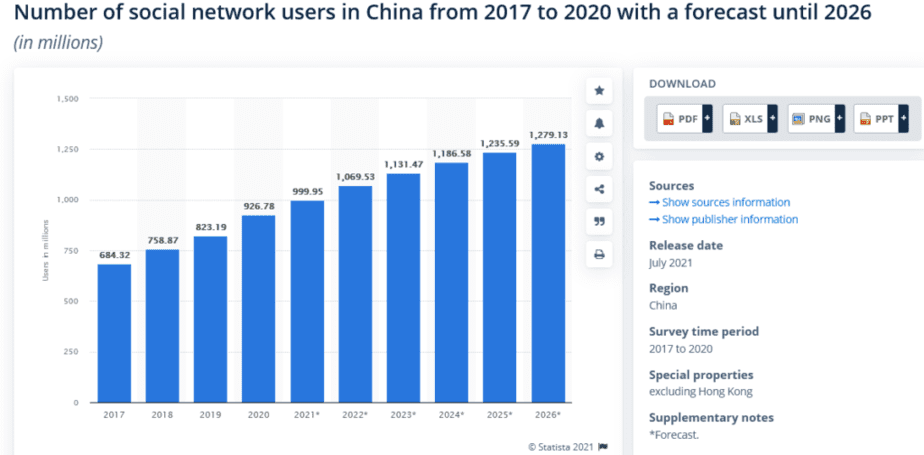
Integrating Chinese social media platforms like WeChat, Weibo, Douyin, Little Red Book into your Chinese website is crucial as consumers tend to trust more in the messages they communicate online or from KOLs (Key Opinion Leaders). In addition, if your marketing video is in another language, it’s vital to hire a professional Chinese video subtitle translation agency and localize your content.
💡 If you’re building your website from WordPress and you’re not using a Chinese localized template, your theme might be inbuilt with international social media platforms like Facebook, Twitter that are blocked in China by the Great Fire Wall. It’s suggested to delete unnecessary inbuilt functions as they drag down website loading speed, and then localize with Chinese social media APPs.
# Remove Blocked Services
Most Western social media and search engine platforms such as Facebook, Twitter, and Google are unavailable due to the Great Firewall of China. If you’re using Google Recaptcha and Google Fonts on your website, your website might not load properly in China. Removing blocked plugins and embeds is an efficient way to make your website works in China.
# Baidu SEO
Want to rank in China?
You’ll need to play the rules of Baidu, the king of search engines in China. It’s the essential of any website localization for China strategy. You might be a Google SEO ninja, however, there’re significant differences between algorithms of Google and Baidu, you’ll need to learn if you want to amplify your online presence in China.
Here’re some lists for Baidu optimization that would take your Chinese online presence to a new horizon.
Optimize for Baidu – Checklists
| List | Purpose |
| cn.domain with Chinese hosting, ICP license | cn.domain ranks better on Baidu. |
| Baidu Webmaster Tools | Submit your website to Baidu, encourage crawl, monitor, and improve your website’s performance. |
| Baidu Keyword Planner | Find the best keywords to target in China. |
| Mobile-first optimization | 98% of China’s netizens are mobile users. |
| Structured data snippets | Better, more eye-catching display of search results. |
| HTML | Baidu doesn’t proceed JavaScript content so make sure your site is html based. |
| Original content in simplified Chinese | It’s important to publish new content in simplified Chinese regularly. Don’t use traditional Chinese as you’re targeting at mainland China instead of HK or Taiwan. |
| Meta, alt tags | Helpful with ranking on Baidu. |
| URL | Don’t use Chinese characters in url slug. Use simple English translation or pinyin. |
| Baidu trust system | Get Baidu Trust Badge that gives more credibility. |
| Marketing on Baidu properties (Baidu News, Maps, Tieba, Wenku, Baike, Zhidao, Jingyan, Lvyou, Nuomi) | Baidu algorithm favors their own properties. |
Frequently Asked Questions
What’s the largest search engine in China?
Baidu is the largest search engine in the Chinese market.
How can I get my website indexed by Baidu?
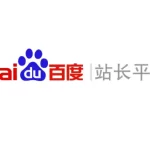
Submitting your sitemap and individual URLs to Baidu Webmaster Tools is an effective way to get your website indexed by Baidu.
How can I submit my website to Baidu?
1. Log in to Baidu Webmaster Tools
2. Verify your website
3. Submit the sitemap
4. Submit individual URLs
How can a website be tailored to appeal to Chinese consumers?
There are several ways to tailor a website to appeal to Chinese consumers:
· Translate the website into Mandarin
· Consider cultural differences
· Optimize the user experience
· Use local payment methods
· Use local social media platforms
# Idioms and Expressions
An in-depth grasp of Mandarin as well as cultural and contextual aspects is crucial for any company looking to enter the Chinese market. Successful expansion into China requires more than good communication.
The ability to incorporate fun, trendy idioms and slang can take your business to next level. These fun phrases will liven up your writing, bringing your brand closer to your Chinese-speaking audience.
# Local Regulations and Laws
In recent years China has witnessed tightening supervision in data protection and compliance.
Foreign businesses that want to expand into the Chinese market successfully must be familiar with Chinese laws and regulations especially Cybersecurity Act and Advertising Laws as they have a significant impact on eCommerce and online marketing. In principle, personal data from Chinese citizens residing in China should not be brought out of the country. Moreover, the Advertising Law regulates the use of extreme words such as “the top”, “the best”, “Number 1” in marketing your products or services, otherwise, it can lead to heavy penalties.
Final Thoughts
Knowledge of the law, regulations, local practices, and cultural nuances is essential for conducting online business in China. Often what is written in English may have a different meaning in Chinese. At Chinesecopywriter.com, we have the expertise to identify and modify the online content to make sure it’s compliant and communicates to the heart of your audience.
Let’s talk. Share your great project with us. WhatsApp: +86 18218494138



